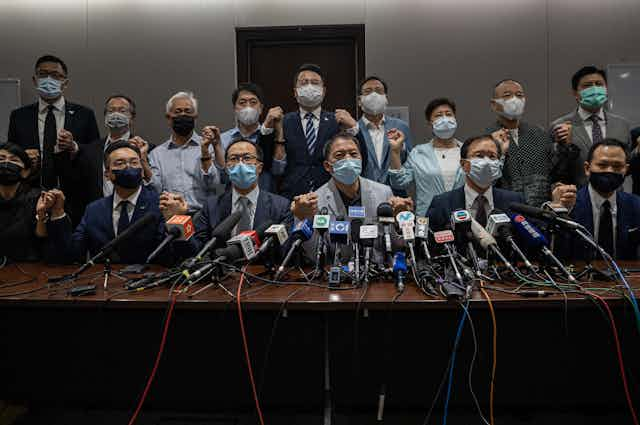Opposition is not welcome here. This was the clear message given to the people of Hong Kong following the expulsion of four MPs from the Hong Kong parliament on November 11 for their “unpatriotic” activities and “endangering national security”. The remaining 19 opposition MPs submitted their letters of resignation the following day.
A spokesperson for China’s Ministry of Foreign Affairs, Wang Wenbin, said that the decision to remove the four MPs was necessary to maintain and improve “the one country, two system” model. Without an opposition within Hong Kong’s parliament, for Beijing, appearance is clearly more important than purpose.
Xi Jinping’s desire to salami slice away the freedoms bestowed upon Hong Kong following handover in 1997 has taken a darker turn. Despite what Beijing and its proxies might say, the concept of “one country, two systems” is dead and freedom of expression is effectively shut down. The people of Hong Kong are free to say what they want – providing that it follows the party line. Hong Kong is now a part of a “one country, one system” model with its assembly now effectively an autonomous theatre in which the actors are fully compliant and follow Beijing’s stage directions and script.
Hong Kong has a parliament without the language of opposition. The National Security Law forbids dissent and is stifling the idea of democracy in the territory.
Read more: Hong Kong: how China's new national security law subverts the territory's cherished rule of law
Hong Kong is now governed by the presence of two elements that sociologist Hannah Arendt identified as necessary for totalitarianism to exist. First, ideology: a strong-man theory explaining the “one way to think” and an environment where people have no control over their own lives. Rule is from within and the Party is always right.
The second necessary element is terror. The passing of the National Security Law is to some extent the beginning of the process of splitting away people who oppose close political integration with the mainland. The Chinese government has announced it is planning to produce a list of “obstinate criminals”. The report does not say whether foreign nationals living in Hong Kong would be included on the list, an ambiguity that is also present in the National Security Law.

What is clear is that the current global political climate has provided the perfect storm for Beijing to enact these different elements and impose a totalitarian system in Hong Kong. The world, on the other hand, is distracted as its gaze focuses on the democratic crisis being played out in the United States.
New era
Following days of silence, a spokesperson from China’s foreign ministry congratulated Joe Biden and Kamala Harris on their election win. This was days after other leaders in the region had offered theirs. This comes on the back of a YouGov poll of Asian countries carried out in October that found popular support for Donald Trump in both Hong Kong and Taiwan.
Trump’s term in office was notable for the frequency of the president’s anti-China slogans which have largely centred on trade and the spread of the coronavirus. Trump is not an internationalist and, as a result of this vacuum, China’s aggressive posturing within the region has been filling that void. Xi Jinping’s reluctance to congratulate Biden was arguably a marker of Beijing’s preferred options.
Read more: South China Sea: after all its posturing, the US is struggling to build a coalition against China
For China, a Trump presidency meant that anything was up for sale. Biden’s election signals a return to an establishment-style presidency. Biden himself has been critical of Xi in the past – in February he referred to the Chinese leader as a “thug” over the imprisonment of millions of Uighurs in Xinjiang.
We don’t know yet whether or how Biden will change the US’s current political stance in the region. He has the tools to heal global relations, in particular those within Europe, NATO members especially. And this could increase checks on China’s military posturing.
Biden is likely to seek to consolidate progressive politics within the United States and a focus on human rights is likely to spill over into US foreign policy. He is widely expected to press China on its human rights responsibilities.
The serious blow to pluralism in Hong Kong might be the opportunity for Biden to send a clear message to the region. One choice he could make is to follow the British government in opening up the United States for Hong Kong immigration. Whatever first step Biden decides to take, he needs to disprove any belief that Beijing might have that the United States is losing its strategic position in the region.

